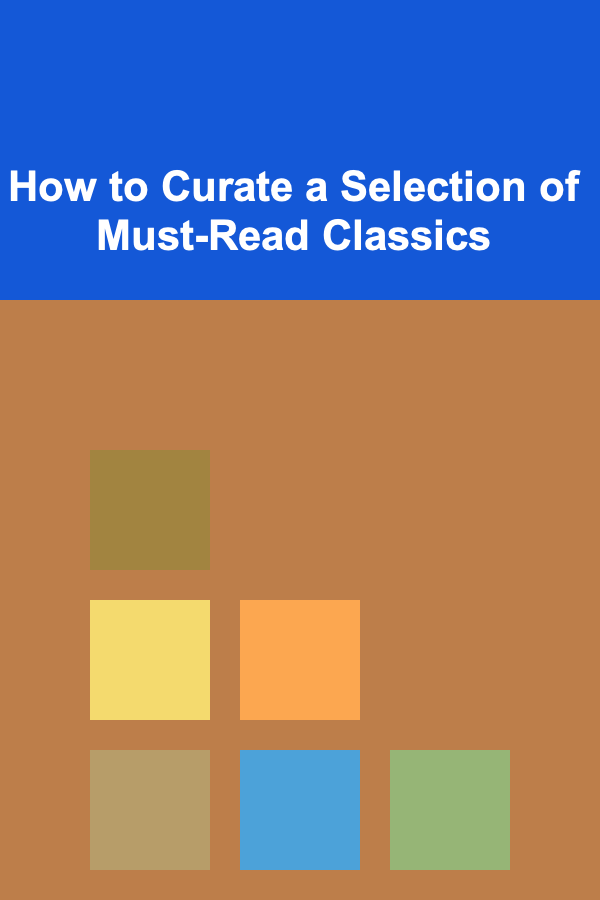
How to Curate a Selection of Must-Read Classics
ebook include PDF & Audio bundle (Micro Guide)
$12.99$6.99
Limited Time Offer! Order within the next:

Curating a selection of must-read classics is an endeavor that deepens our understanding of literature, history, and the human condition. Classics offer timeless themes, profound insights, and rich storytelling that resonate across generations. This guide will explore the process of curating a collection of must-read classics, from defining what constitutes a classic to recommendations and thoughtful strategies for arranging your selection.
Introduction
The literary canon is filled with works that have stood the test of time, influencing writers, thinkers, and readers alike. Curating a selection of must-read classics not only enhances personal reading experiences but also fosters cultural literacy, critical thinking, and an appreciation of different perspectives. This guide aims to provide a comprehensive roadmap for selecting, organizing, and engaging with classic literature, ensuring that readers from all backgrounds can find value in these enduring texts.
Defining "Classic" Literature
Historical Context
The term "classic" has evolved over time, often associated with works deemed worthy of preservation and study. Historically, classics are those texts that have maintained relevance through changing societal norms, values, and literary trends. They often emerge from significant historical periods that shape their narratives and themes.
Key Historical Figures: Many classics are associated with influential authors who contributed significantly to their respective genres. For instance, William Shakespeare, Jane Austen, and Leo Tolstoy are celebrated for their substantial impact on literature.
Common Characteristics
Classics frequently share certain characteristics that solidify their place in literary history:
- Timeless Themes: Classics address universal human experiences such as love, conflict, identity, and morality.
- Rich Characterization: They often feature complex characters that reflect the intricacies of human nature.
- Enduring Relevance: Their messages resonate across cultures and time periods, allowing readers to connect with them regardless of context.
- Innovative Language: Many classics showcase unique styles, employing innovative language or literary techniques that influence future generations of writers.
Criteria for Selection
When curating a selection of must-read classics, consider various criteria that ensure a balanced and enriching collection.
Cultural Impact
Classics often reflect cultural shifts or movements that have shaped society. Assessing a book's impact on culture can illuminate its significance.
- Influence on Society : Works like Harriet Beecher Stowe's Uncle Tom's Cabin played crucial roles in raising awareness about social issues such as slavery.
- Adaptations: Consider how frequently a work has been adapted into films, plays, or other media, which often indicates its resonance with audiences.
Literary Merit
Evaluate the literary qualities of each work to ensure it meets high standards of writing.
- Narrative Structure: Look for innovative plotting, compelling pacing, and skillful use of literary devices.
- Language and Style: Analyze the author's unique voice and the effectiveness of their language choice in conveying themes.
Diversity of Voices
A well-rounded selection of classics should represent diverse voices and perspectives:
- Gender Diversity: Include works by female authors such as Virginia Woolf and Toni Morrison.
- Cultural Representation: Ensure that your collection features authors from different cultural backgrounds, such as Chinua Achebe and Gabriel García Márquez.
- Global Perspectives: Explore classics from various countries to broaden your understanding of world literature.
Creating Your Must-Read Classics List
With selection criteria in mind, you can start creating your list of must-read classics.
Personal Preferences
Consider your own reading preferences and interests when curating your collection:
- Favorite Authors: Include works from authors whose styles resonate with you.
- Genres: Factor in your preferred genres, whether that's fiction, drama, poetry, or essays.
Genre Considerations
Incorporate a range of genres within your classics selection to appeal to various tastes and interests:
- Fiction: Novels that explore character development and narrative arcs.
- Poetry: Collections that capture emotions and ideas through verse.
- Drama: Plays that reflect societal issues and human conflicts.
Time Periods and Movements
Include classics from various literary movements and historical contexts to offer a more extensive overview:
- Romanticism: Works by authors like William Wordsworth and Emily Brontë.
- Modernism: Texts by T.S. Eliot and James Joyce that challenge conventional narrative forms.
- Postcolonial Literature: Explore works by authors like Salman Rushdie and Chimamanda Ngozi Adichie.
Recommendations: A Selection of Must-Read Classics
Here's a curated selection of must-read classics, representing various genres, themes, and authors:
Fiction
-
Pride and Prejudice by Jane Austen
- Explores themes of love, class, and social expectations.
-
Moby-Dick by Herman Melville
- An epic tale of obsession and the human spirit set against the backdrop of the whaling industry.
-
One Hundred Years of Solitude by Gabriel García Márquez
- A multi-generational saga that blends magical realism with profound historical insight.
Poetry
-
The Waste Land by T.S. Eliot
- A landmark modernist poem reflecting the disillusionment of post-World War I society.
-
Leaves of Grass by Walt Whitman
- A celebration of individuality and the American experience through free verse.
Drama
-
A Doll's House by Henrik Ibsen
- A groundbreaking play examining gender roles and societal expectations.
-
Waiting for Godot by Samuel Beckett
- A seminal work in absurdist theatre questioning existence and meaning.
Non-Fiction
-
The Souls of Black Folk by W.E.B. Du Bois
- A foundational text in African American literature addressing race, identity, and civil rights.
-
The Interpretation of Dreams by Sigmund Freud
- A pioneering work in psychology that explores the significance of dreams in understanding the subconscious.
Arranging Your Collection
Once you've compiled your selection, consider how to arrange your classics for easy navigation and enjoyment.
Alphabetical vs. Thematic
- Alphabetical Arrangement: Organizing books alphabetically by title or author can facilitate quick access.
- Thematic Arrangement: Grouping books by themes, genres, or movements allows for deeper exploration of related topics.
Physical vs. Digital Collections
- Physical Collections: If you have physical copies, consider using shelves, bookcases, or display cases to showcase your classics thoughtfully.
- Digital Collections: If you prefer e-books, utilize digital platforms that allow for easy categorization and searching.
Engaging with Your Classics
Curating a selection of must-read classics goes beyond mere organization; engaging with these works enriches the reading experience.
Reading Groups
Joining or forming a reading group focused on classic literature can enhance your understanding and enjoyment:
- Discussion Opportunities: Engage in conversations about themes, characters, and interpretations.
- Accountability: Having scheduled discussions can motivate you to read consistently.
Supplemental Resources
Consider utilizing supplemental resources to deepen your engagement:
- Study Guides: Use guides or companion books to gain insights into the historical and cultural context of each classic.
- Documentaries and Lectures: Explore documentaries or online lectures focused on classic literature to gain a broader perspective.
Case Studies: Successful Classic Collections
Case Study 1: University Library
A university library implemented a dedicated section for classic literature, organized by genre and time period. Regular events, including author readings and discussions, encouraged student engagement and fostered a vibrant literary community.
Case Study 2: Public Reading Program
A public library launched a "Classics Month" initiative, highlighting different classics each week. They provided reading materials, hosted discussions, and encouraged community participation, resulting in increased circulation and interest in classic literature.
Case Study 3: Online Book Club
An online book club focusing on classic literature attracted members worldwide. By using digital platforms for discussions and hosting guest speakers, they created a diverse and inclusive space for exploring classics together.
Conclusion
Curating a selection of must-read classics is a rewarding endeavor that enriches both individual readers and the broader literary community. By defining what constitutes a classic, setting clear selection criteria, and thoughtfully arranging your collection, you can create a resource that not only honors timeless texts but also inspires new generations of readers.
This guide provides a comprehensive framework for curating and engaging with classic literature. Whether you are a seasoned bibliophile or just beginning your journey into the world of classics, the effort invested in this process will lead to a deeper appreciation of literature's enduring power and relevance. Happy reading!
Reading More From Our Other Websites
- [Home Soundproofing 101] How to Create a Soundproof Music Room on a Budget
- [Skydiving Tip 101] Breaking Down Freefall Speeds: Beginner vs. Expert Skydivers
- [Home Rental Property 101] How to Create a Renters' Handbook for Your Property
- [Organization Tip 101] How to Adjust Your Budget for Major Life Changes
- [Mindful Eating Tip 101] The Stress-Free Plate: Simple Mindful Eating Practices for Everyday Relief
- [Organization Tip 101] How to Set Up a Functional and Tidy Home Office
- [Home Budget Decorating 101] How to Make Your Home Feel Luxurious with Budget-Friendly Updates
- [Home Party Planning 101] How to Organize a Backyard BBQ Party for Friends and Family
- [Personal Investment 101] Turn Your Deep Learning Expertise into a Steady Income Stream
- [Organization Tip 101] How to Organize Recipes for Meal Prepping

How to Tidy Your Home When You Have a Busy Schedule
Read More
How To Understand Cold Spray 3D Printing
Read More
How to Use Decorative Trays for Remote Controls and Small Items
Read More
How to Sketch Characters in Different Poses
Read More
Decoding EV Battery Warranties: A Comprehensive Guide
Read More
10 Financial To-Do List Items for Single Parents
Read MoreOther Products

How to Tidy Your Home When You Have a Busy Schedule
Read More
How To Understand Cold Spray 3D Printing
Read More
How to Use Decorative Trays for Remote Controls and Small Items
Read More
How to Sketch Characters in Different Poses
Read More
Decoding EV Battery Warranties: A Comprehensive Guide
Read More